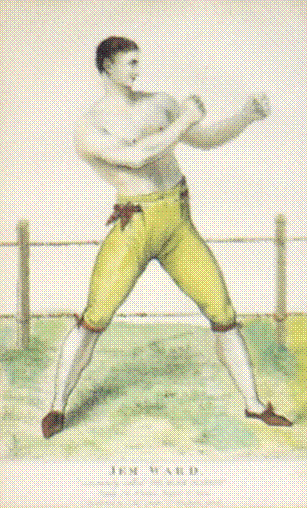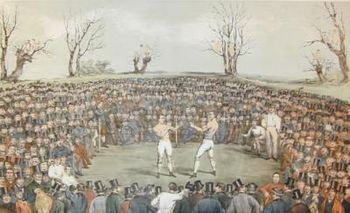
Jem Ward
Encyclopedia

Bare-knuckle boxing
Bare-knuckle boxing is the original form of boxing, closely related to ancient combat sports...
boxer. "A fine fighter and powerfully built man", he was the English champion boxer from 1825 until 1831. However, he is most notable for being the first boxer to be officially disciplined for deliberately losing a fight. During his fighting career he was nickname
Nickname
A nickname is "a usually familiar or humorous but sometimes pointed or cruel name given to a person or place, as a supposedly appropriate replacement for or addition to the proper name.", or a name similar in origin and pronunciation from the original name....
d "The Black Diamond". In his retirement he became a successful artist.
Boxing career
Ward first became a professional boxer in 1815, at 15 years of age. He was 5 ft 11 inches (1.80 m) tall, and weighed 12 stoneStone (weight)
The stone is a units of measurement that was used in many North European countries until the advent of metrication. It value, which ranged from 3 kg to 12 kg, varied from city to city and also often from commodity to commodity...
(76 kg). His first fight was victorious against George Robinson and from this point he never lost a match, until he lost to Bill Abbott in 1822. This was the controversial bout that wrecked Ward's early professional career. He was heard to call to his opponent “Now, Bill, look sharp, hit me and I’ll go down.” He was promptly hit and fell to the ground. Abbott was considered to be an inferior boxer to Ward, and suspicions were immediately aroused. The Pugilistic Society, the body which then governed boxing and enforced the London Prize Ring rules
London Prize Ring rules
The London Prize Ring Rules was a list of boxing rules promulgated in 1838 and revised in 1853. These rules were based on those drafted by Britain's Jack Broughton in 1743 and governed the conduct of prizefighting/bare-knuckle boxing for over 100 years...
, held an inquiry. Eventually after confessing he had received a £100 bribe to lose, Ward was banned from fighting in any contest governed by the Society. In this era boxing was heavily betted upon, by members of all strata of society, including the sons of King George III.
The incident has left Ward's reputation with a lasting stigma
Social stigma
Social stigma is the severe disapproval of or discontent with a person on the grounds of characteristics that distinguish them from other members of a society.Almost all stigma is based on a person differing from social or cultural norms...
. Ward was the elder brother of the boxer Nick Ward, who also had a reputation for using unfair tactics. Nick Ward, however, did not achieve the same success as his brother in the ring.
Deprived of his living Ward was reduced to travelling the country fighting under assumed names at fairs or in any chance ungoverned brawl where he could possibly pick up a prize. Once early in 1823 when attending a bout as a spectator, he was called upon to enter the ring, when the planned fight ended prematurely, and someone was needed to provide entertainment to keep the crowd present and spending money. He fought Ned Baldwin and defeated him, but the match was void due to his ban. Under the pseudonym
Pseudonym
A pseudonym is a name that a person assumes for a particular purpose and that differs from his or her original orthonym...
Sawney Wilson and claiming to be an inexperienced boy, he beat the champion Joe Rickens, thus making the bookmaker
Bookmaker
A bookmaker, or bookie, is an organization or a person that takes bets on sporting and other events at agreed upon odds.- Range of events :...
s a fortune. Later in 1823, the Pugilistic Society decided to re-allow him to enter their fights.
After his reinstatement, he lost his first fight to Josh Hudson. In 1825, anxious for publicity and thus money, he challenged and fought the reigning heavyweight champion Tom Cannon
Tom Cannon
Tom Cannon is Professor of Strategic Development at the University of Liverpool Management School. He is considered to be an expert on Sports finance, economics and business notably professional sports like soccer, F1, cricket, rugby , tennis, horse-racing, American football and is often featured...
. This proved to be the very high profile match Ward needed, with Cannon seconded by two previous champions Tom Spring
Tom Spring
Tom Spring was an English bare-knuckle fighter. He was heavyweight champion of England in 1821 until his retirement in 1824...
and Tom Cribb
Tom Cribb
Tom Cribb was an English bare-knuckle boxer of the 19th century, so successful that he became world champion. He is a member of the International Boxing Hall of Fame.-Life:...
, names guaranteed to draw the crowds. The match took place on 19 July 1825 at Stanfield Park on a very hot day with the temperature reputedly over 90 degrees Fahrenheit. It took Ward just over 10 minutes to dispatch Cannon and become the new English champion.

Peter Crawley
Peter Crawley was a British bare-knuckle boxer. He became Heavyweight Championship of England in 1827.-1816-1817:*Bill Hunt - WIN*Jack Bennett - WIN*Tom Price - WIN...
. He was defeated by Crawley but quickly reclaimed the title when Crawley retired immediately after their match. Ward's last match was in 1831. On July 12, he fought his last fight against the Irish champion, Simon Byrne
Simon Byrne
Simon Byrne , nicknamed "The Emerald Gem", was an Irish bare-knuckle prize fighter. The heavyweight boxing champion of Ireland, he was drawn to England by the larger sums of prize money on offer and his hopes of becoming the heavyweight champion there as well...
. After an hour and seventeen minutes Ward was victorious, and retained his heavyweight title until his retirement in 1831.
His 1831 retirement was forced. Ward had received criticism for refusing to face the younger challenger, James Burke
James Burke (boxer)
James "Deaf" Burke , 6 feet 2 inches tall, weighing 200 lb , was one of England's earliest boxing champions. He trained in the area around the River Thames....
, and rather than fight he retired and relinquished his title. However he did not relinquish to Burke his championship belt, when pressed he agreed to hand it over to the victor of Burke's match against his last adversary Simon Byrne in 1833. However, Ward refused to hand over the belt when Burke beat Byrne who Ward supported. Byrne, who had been knocked unconscious died three days later after the fight, Burke was tried and acquitted of his murder, but Ward still refused to part with the championship belt. He finally handed the belt over to William ‘Bendigo’ Thompson at the Queen’s Theatre in Liverpool
Liverpool
Liverpool is a city and metropolitan borough of Merseyside, England, along the eastern side of the Mersey Estuary. It was founded as a borough in 1207 and was granted city status in 1880...
following the latter's defeat of Burke in 1839.
Retirement
In retirement he kept the "York Hotel" in Liverpool, where he was taught to paint by his great friend the artist William DanielsWilliam Daniels (artist)
William Daniels is an English artist.Based in London, he produces oil paintings that recreate iconic historical works—portraits, landscapes, nudes, etc.—using as subjects rough maquettes constructed from waste card and paper. For instance, his William Blake II is based on theThomas...
. He became an accomplished and proficient artist exhibiting his work in London and Liverpool. As a musician he played both the violin and flute, and sang in concerts. He also taught the boxing arts to students, one of whom, Tom King
Thomas King (boxer)
Tom King also known as "The Fighting Sailor" was an English boxer who fought both bare-knuckle and with gloves. Strong, fast, and durable he was a skilled pugilist. He retired from the ring in 1863, as the Heavyweight Champion of England, following his defeat of the boxer Jem Mace...
, went on to defeat the legendary Jem Mace
Jem Mace
Jem Mace was an English boxing champion. He was born at Beeston, Norfolk. Although nicknamed "The Gypsy", he denied Romani ethnicity in his autobiography...
to become heavyweight champion in 1863. Ward died in 1884 at his home in Liverpool. He was elected to the International Boxing Hall of Fame
International Boxing Hall of Fame
The modern International Boxing Hall of Fame is located in Canastota, New York, United States, within driving distance from the Baseball Hall of Fame and Museum in Cooperstown and the National Soccer Hall of Fame in Oneonta...
in 1995.

